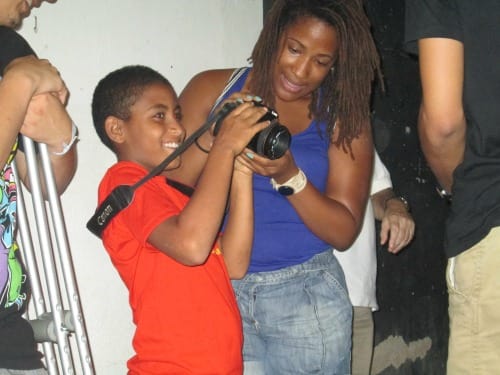 “Education either functions as an instrument which is used to facilitate integration of the younger generation into the logic of the present system and bring about conformity or it becomes the practice of freedom, the means by which men and women deal critically and creatively with reality and discover how to participate in the transformation of their world.” — Paulo Freire, Pedagogy of the Oppressed
“Education either functions as an instrument which is used to facilitate integration of the younger generation into the logic of the present system and bring about conformity or it becomes the practice of freedom, the means by which men and women deal critically and creatively with reality and discover how to participate in the transformation of their world.” — Paulo Freire, Pedagogy of the Oppressed
Breaking down the rigid structures that would reinforce old models for teaching is an act of revolution. Revolution rises naturally out of a deep current of unrest and dissatisfaction. It can begin quietly as apathy or indifference, but gradually, this force of latent chaos and dissatisfaction will continue to grow, especially in circumstances where there is a chronic complaint. As it pertains to economic and racialized systems that current generations have inherited, such as colonialism and neo-liberalism, observers can take note of how populations and groups of innovative thinkers have resisted these mechanical/robotic structures within society’s institutions, particularly when it comes to systems of learning where children should gain practical knowledge through educational practices.
SEE ALSO: Liberian Government Concludes Oil Consultation
The Problem on the Ground: Oppressive Education
The African Diaspora has been challenging old paradigms of teaching and learning because of a severe necessity that comes from an historical past that has proved dysfunctional not only for the system’s goals of socializing youngsters but certainly for the higher goals of engaging students on a level of human potential and a sense of communal responsibility.
In this respect, the complex case of Brazil comes to mind. Brazil has been noteworthy over the recent decade for higher than typical economic growth rates and a virtual boom.
However, this reality conceals serious discrimination in the education system.
An extreme case of this is in the Brazilian city of Salvador, Bahia, where 80 percent of the population defines itself as Black but fewer than 55 percent of admitted college students in the more prestigious public universities were Black or indigenous.
In another city, Belo Horizonte, there are also significant differences between classes that reflect themselves in the city’s vast socioeconomic inequalities and therefore in the primary and secondary public school systems.
The majority of lower income and non-White students attend free public high schools. These public high schools, by design, do not prepare students for the rigors of higher education.
In Brazil this summer, I confirmed that while a new reformed law, The Law of Quotas, now prescribes that a quota of 50 percent of the public universities’ intake should come from public secondary schools, discrimination reasserts itself at a higher level because the law will not effect the debilitating condition in these secondary schools that result in chronic lower levels of literacy and academic achievement. Without quality supports to make up for those deficits, under the new quota system, Brazil will face what students of similar circumstance face in the United States: higher attrition rates.
Correcting such deficits is a complex and multi-disciplinary process because much of the historic failure to enter in to and/or remain in higher-level institutions is traceable to inadequate instruction in primary and secondary education.
The result is illiteracy and a general failure on the part of institutions to adequately prepare students to be viable and empowered assets to their communities.
Concrete Solutions
The solution then would be a direct confrontation to teaching systems that complements antiquated models of instruction.
In the case of Brazil, one can witness the budding of change even within a rigid history of highly discriminative educational systems. Many social programs are emerging to address the shortcomings of an old education system. For example, Projeto Tvlata by the Cultural Group Bagunçaço is a program in one of Salvador, Bahia’s neighborhoods that addresses the academic, social, and artistic educational needs of children in a more holistic way.
The project uses film and music to engage students on a higher level of learning than is traditionally offered by the public school system.
I visited the project and spoke to the director who facilitates a project for kids that is driven by their own interest and research. The project’s students, after years of involvement, acquire a true experiential knowledge of filmmaking because much of what they have learned is based on their own research.
And many such projects are emerging throughout the African Diaspora, including one that I will implement called the “Solidarity Project.” The prophetic words, immortalized in 1970 by Brazilian educator Paulo Freire, predicted a division that would occur among educators in terms of pedagogical practices: Educators around the world would either use education as a tool to further socialize the younger generation to conform to old ways of thinking or use education as a tool to facilitate the empowerment of youngsters to be our future leaders and transformers of the world.
Since Freire’s time, education systems have undergone tremendous changes, and we will continue to look at the intricacies around this paradigm shift in various projects throughout the African Diaspora with particular attention to Brazil.
SEE ALSO: SA President Jacob Zuma Accused Of Misusing Funds, ANC Responds
Iyabo Kwayana (pictured in top photo, far left) is a filmmaker at Lotus Tribal Works who is currently based in Brazil. A UCLA and Spelman College graduate, Kwayana is also a world traveler and former English teacher who uses photography to both educate and elevate. In her words, “My artistry comes out of a deep somewhat metaphysical yearning and commitment to observe value and appreciate value in all settings and subjects through the focus and attentive gaze of my lens. … I try to create miracles in my photography and teaching by not letting my judgments and limited perception interfere with the unlimited nature of a thing.”










